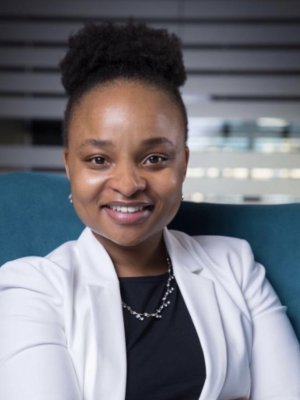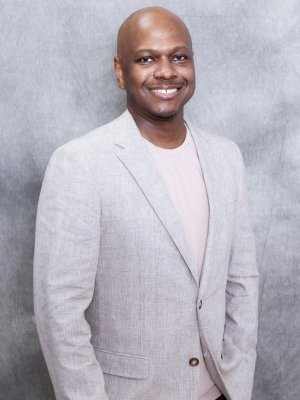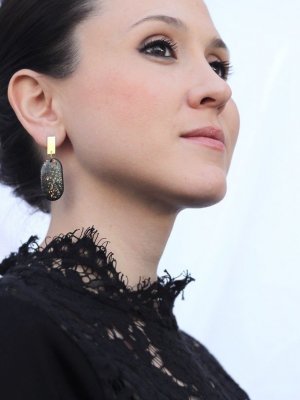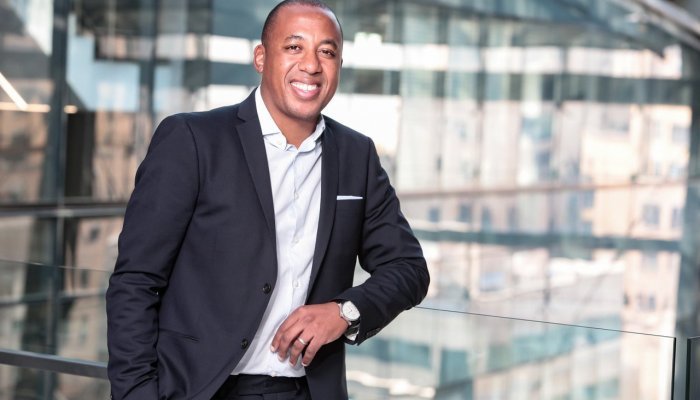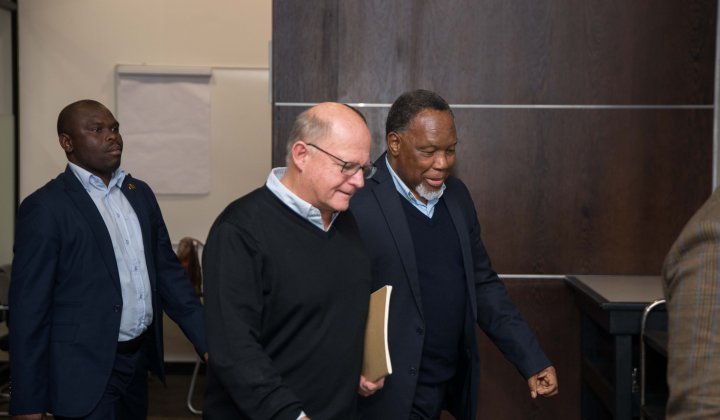A six-year tenure at one company saw Jean-Luke Pieterse climb up the organisation's organogram. Joining as a junior actuarial analyst in 2015, he was promoted to new jobs such as operations manager and product manager/data analyst. But then he started to feel like the ladder he was on had limits. While he initially planned to climb the ranks towards the C-suite level, Pieterse realised that his employment opportunities were stagnating rather than growing.
In 2020, he signed up for an MBA hoping to accelerate his career. “The initial reason for pursuing an MBA was to grow my network and expand my knowledge and business acumen, to be seen as a strategic resource and asset to the company I was employed at. However, GIBS presented us with the opportunity to join one of two MBA streams, either entrepreneurship or consulting. I chose the latter to transition my career into consulting.”
Back to the books
Alongside the theory on topics such as financial and accounting management, strategic implementation and human resource strategy, Pieterse also acquired new skills and confidence. “The course material as well as the class interactions provided me with problem-solving and critical thinking capabilities and an open forum to discuss and debate key business, economic and social topics.”
Having elected the consulting stream, Pieterse decided that after completing the MBA, he would in fact move out of his previous career and into consulting. Today, he’s an associate management consultant at Kearney. It wasn’t an industry he’d ever considered but armed with an MBA, he knew it was one he would not only enjoy, but one that could deliver continued growth.
For Rebecca Twala, also in the 2020 class, obtaining an MBA wasn’t about moving up the career ladder but about self-discovery. She enrolled during a difficult time, with the qualification offering a possible way out. “I was in a job I hated,” she recalls. “It was a good job from the eyes of someone looking in but definitely nowhere near a job I wanted to do for the rest of my life. I didn’t really know what I wanted to do but I knew that my purpose was far greater than the work I was doing at that moment.”
In research for ways to branch out into a different industry or career path, an MBA kept popping up, so Twala decided it was worth pursuing. She’d already worked as an independent business consultant and a senior management consultant, so the consulting stream was an easy decision. But she did also want radical change. “During my MBA, I made a pact with myself to be in a decision-making role in strategy. The idea of being part of something from conception through to impact and seeing the fruits on a large scale always seemed so daring.” True to her promise, Twala completed her MBA in December 2021, and made a bold career move. “I applied for a role I had little industry and business unit experience in, and I am so glad I did!”
Work has been “hectic”, confesses Twala, but it’s also exactly what she hoped for. Noting the rewarding aspects of management consulting helps with perspective for when times are tough. For Twala, this has been the go-live date on a project, because something always goes wrong, such as when “either at last minute testing, the solution doesn’t work or the client changes the entire direction a few weeks before go-live without adjusting deadlines”. But the exhilaration of seeing concepts come to life makes the build-up hardships worthwhile.
Getting down to business
While working as a medical doctor, Adolf Makgatho started four businesses. Three were moderately successful but the fourth was such a dismal failure that he decided to learn more about the business world. He enrolled for an MBA, initially planning to apply what he would learn to future entrepreneurial ventures that would be in the health sector.
But then his interests and plans changed. “My horizons were broadened and I started to find the new perspectives about business very exciting. By the second year of the MBA, I was exploring going into corporate. I wanted to apply what I’d been learning and grow further in this new world I’d been exposed to.”
Straight after finishing his studies, Makgatho made the move out of practicing medicine into consulting. He joined McKinsey as a management consultant, and in 2022 was elected partner at the consulting firm.
The unexpected and unplanned career change has been wonderful because Makgatho says being a consultant means he can reference his past and bring his unique perspective to every project. “The most amazing thing about being a consultant is that I can still bring my whole self to the work. My previous experience as a doctor is not wasted. My previous experience as an entrepreneur is helpful. I’ve been so pleasantly surprised that my combined past studies and work have relevance in what I do now. Combining different skill sets from my background with a deeper understanding of businesses has helped me find my own niche.”
Anneke Wolmarans has also made a career switch, in her case from law into consulting. She worked as an attorney and chief legal and commercial officer and enrolled for an MBA to “escape the ring fence my law degree placed on me”.
Business school delivered exactly what she’d been hoping for and enabled her to start her own business as a commercial advisor. An MBA facilitated the career change she wanted, but some aspects of her new path have remained the same. “My passion is helping people and organisations realise their potential. So for me, really tough situations are when clients are not really receptive to input or actual consultation. I struggle with clients who have predetermined outcomes which they seek and they want me to ‘find’ the evidence which supports their viewpoint.”
Wolmarans draws on her legal background, but particularly relishes the full organisational view that consulting offers. “My favorite part of a consulting project is when talking to the staff, finding out their ideas about what is going well and what can improve the organisation. Those sessions are where you gauge who is invested and who isn’t. Usually their passion ignites my own and aids my endurance through projects. Helping a business improve for the benefit of everyone – not just the bottom line – is what drives me.”
The best of both worlds
Years ago, while at the Deloitte Graduate Academy, John Makgato was exposed to consulting. He’d studied accounting and went on to work in the field but the affection for consulting remained. When he felt like his career trajectory was beginning to stall, Makgato signed up for business school. GIBS was an undisputed first choice. “The clincher was the consulting stream because it offered an opportunity to learn and train while also being very practical.”
During his studies, Makgato created consulting tools and worked on a consulting project focused on strategy and innovation and solving customer problems through a compelling integrated value proposition design framework.
It was the ideal preparation for the job that he now has: head of youth and CVP for Nedbank. He opted not to work for a traditional consulting house, choosing instead a job that better matched his interests and plans. “In innovation & design we were asked to think of ourselves as an entity and how you would innovate and design your next stage. This involved thinking about preparing, positioning and being ready to change and transition as the world demands.”
Makgato has a dream of one day providing independent consulting services but for now loves his current job because of the flexibility and variety it offers. “The essence of consulting is the facilitation of problem solving through insights and solution design; my job allows me to do a lot of that. What drew me to the consulting stream at GIBS was that I wanted to learn these skills which I had been exposed to through consultants I had worked with who fascinated me. And now I get to use those skills on a daily basis.”
Three Key Takeaways
The consulting MBA isn’t just about consulting: John Makgato specifically wanted to learn about consulting but learnt much more during his studies at GIBS. “I loved how GIBS revamped their programme from siloed subjects into thematic core modules that are essentially the approach to strategy with leadership interwoven into them. I loved how in each module there would be between four to six faculty coming in and giving their expertise within that context.”
The post-MBA pathway is varied: getting a job at one of the big consulting companies is a common option for graduates but it’s definitely not the only one. Career options include working within a company and bringing the consulting knowledge and skills to a role or, for those who are entrepreneurially inclined, starting your own consultancy, as former attorney Anneke Wolmarans has done.
Experience in different industries is beneficial: when you’re making a career change, obtaining an MBA allows you to build on your existing knowledge and skills. Adolf Makgatho, who switched from being a medical doctor to a management consultant, says business school has helped him craft a niche which blends theory with his previous skills and experience. “Outside of teaching me the technical parts of business, an MBA has given me confidence. It’s helped me understand the complexities of business and made it easier to distill them down to the basic fundamentals that matter most.”



